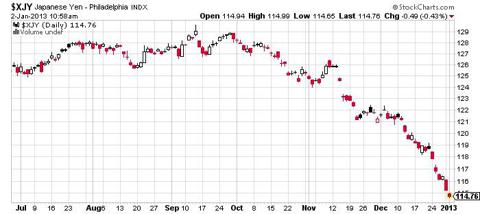Michael Lombardi wrote - The last couple of weeks of 2012 and the start of 2013 may not have been the best for gold investors, but I don't mind. For the past 10 years, whenever I see gold prices retreat, I look at the situation as an opportunity for buying more gold-related investments. This investing methodology has served me well.
In the past week, gold prices witnessed extensive decline; they traded as high as $1,695 an ounce on January 2, but sold off on January 4 to a low of $1,626. Why all this chaos and huge swings in gold prices?
In the Federal Open Market Committee (FOMC) meeting minutes that were just released, some members expressed concern about quantitative easing (QE) and discussed ending it sometime in 2013. (Source: Federal Reserve, January 3, 2012.) In response to the released FOMC minutes, some investors panicked and sold their gold positions. The original plan was to continue printing until unemployment hits 6.5%.
We need to keep in mind that gold is a global currency-it stores value. Currently, central banks around the world are in a race to devalue their currency. The reasons are pretty much the same; their currency value is appreciating against the U.S. dollar, which makes their exports expensive.
To give you an idea about how badly central banks want their currency to decline, the Japanese central bank and the government have been working together to devalue the Japanese yen. Look at the chart below.
Chart courtesy of StockCharts.com
The Japanese yen has fallen significantly compared to a basket of popular world currencies. When the government and the central bank were criticized for devaluing the currency, the Japanese Finance Minister Taro Aso said, "Foreign countries have no right to lecture us." (Source: Bloomberg, "Japan Rebuke to G-20 Nations May Signal Moves to Weaken Yen," December 31, 2012.) In 2012, the Japanese Yen declined more than 10% against the U.S. dollar.
Sadly, the central bank of Japan is not the only one working to devalue its currency. Our central bank, the Federal Reserve, has been doing the same since the financial crisis in the U.S. economy began. Even if it stops now, the damage has been done.
In recent days, the central bank of the Philippines has joined the race in which Brazil and South Korea are already involved: to devalue their currency. The Bangko Sentral ng Pilipinas (BSP), the central bank of the Philippines, lowered its benchmark interest rate four times in 2012 alone. (Source: The Philippine Star, December 31, 2012.)
Gold prices have come under scrutiny is the past few weeks, but the fundamentals haven't changed. Dear reader; pullbacks in any rising bull market are an indication of a healthy market. Currently, central banks around the world are racing to devalue their respective currencies. The more they print, the higher I expect gold prices to go.
Where the Market Stands; Where it's Headed:
In one pocket, out the other…
Congress spent so much time debating the fiscal cliff, finally putting through a plan that would result in $60.0 billion a year in more taxes, mostly from the "rich." At the same time, Congress is pushing through $60.0 billion in aid for Hurricane Sandy victims. Is this not a wash in the government's current fiscal plan?
I'm seeing the popular financial media focus on the wrong side of the equation. Forget what's happening in Washington for now. Corporate earnings growth is stalling-actually turning negative; this is the big news. And this is what will ultimately put downside pressure on the stock market.
What He Said:
"Investors have been put into an unfair corner. Those that invested in stocks because they got caught in the tech boom (1999) have seen their investments gone. Now, those that have leveraged heavily to play the real estate game, because it is the place to be (2005), could see the same fate as the stock market investors. Thanks again, Mr. Greenspan." Michael Lombardi in Profit Confidential, May 27, 2005. Michael started warning about the crisis coming in the U.S. real estate market right at the peak of the boom, now widely believed to be 2005.
